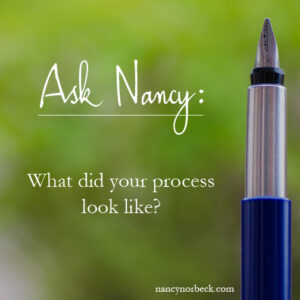Last time, I shared my conversation with a friend who was having trouble figuring out how to turn her vague ideas into something more. This week, I want to share the second half of our conversation, which veered into what my process looked like as I was writing THE SILVER CHILD. How did I get from there—the very first page—to a finished novel?
If I were going to subtitle this conversation, I’d call it “The Power of Questions and Deadlines.”
Caroline: i just keeping thinking about you…how you wrote this book and are signing it in bookshops….how did you get there? ’cause all i have are vague dreamy bits in my head
Caroline: (and i don’t mean that as comparison, or what i even aspire too, i just keep wondering about the arc of how it happened)
how the ball started rolling or bouncing or whatever
Nancy: I started that with nothing.
Literally nothing.
I started it with an unfinished first line. “The baby had been born with _____.” And I finished it with a huge cliche.
And said, “But you can’t be born with a silver spoon in your mouth. Duh.” And then, god bless Neil Gaiman, a little voice in my head said, “But what if you could?”
So the questions are as important as anything else as you write something. Especially as you write something big.
Because you’re sitting there saying, “What if you were born with a silver spoon in your mouth?” and that leads to a pile of other questions, like:
How could that possibly happen?
How would people react? The doctors? Your parents? Friends?
Would you be a freak or would you be normal? If you’re normal, why? What does that tell you about this society?
Do you have to hide it? Can you be this silver-born person in public safely?
Would anyone find you interesting at a terrifying level, like a government or reliigious group (or, god help you, both)?
And that’s where your story comes from.
It’s both of those things put together.
Caroline: very cool
Nancy: The questions keep you going.
Solving the mystery keeps you going. And the mysteries are big and small. Sometimes it’s just “How’s she going to get through the next five minutes?” and sometimes it’s “Cripe, what does this mean for the rest of the book? Everything just changed…”
This, to me, is what makes writing exciting. I wouldn’t do it if it didn’t involve all this wondering and learning and questioning. If I knew the answer ahead of time, I’d never need to write the book, because I’d already know how it ends.
And I write because I NEED to find out.
Also, deadlines help a lot. If you can set up some sort of deadline you’ll respect (so not “I’m gonna send this to Nancy by Friday” unless you really care that Nancy get it by Friday—you have to be invested in the deadline), it will keep you moving and magical things will happen.
Got a question? Send me a note: nancy@fycuriosity.com

